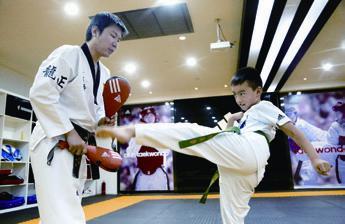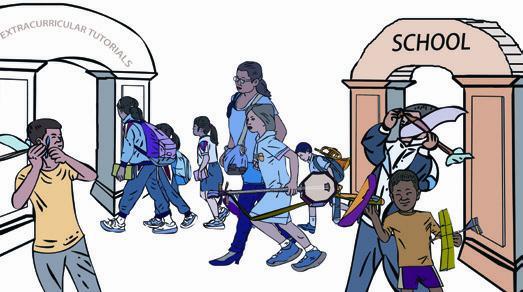RESHUFFLING AN INDUSTRY
By Yuan Yuan
With the return of students to inperson classes after the abatement of the novel coronavirus disease outbreak and summer vacation, K-12 after-school tutoring services have also seen a revival after more than half a year. While students file into their afterschool classes, all virus prevention measures are required—masks, 1-meter distance lines, contact-free hand washing equipment—the same as those in regular schools.
After decades of development, afterschool tutoring services have become a large industry in China. Sprouting in the 1980s, the industry has entered a stage of rapid growth since the 1990s, becoming an important choice for many parents and students.
In 2019, the market scale of this industry was over 700 billion yuan ($102.4 billion), with offline education dominating the market at over 95 percent, according to iResearch, a leading provider of online audience measurement and consumer insights in China.

Offline vs. online
Luo Aihua, a 50-year-old teacher working for Shuren Education and Technology Group, a major K-12 after-school tutoring service provider, moved her classes from online to offline in Nanjing, capital city of Jiangsu Province in east China, in late May after moving in the opposite direction in early February.
It was a revolution for her to go online in February. She had never given it any serious thought before since she taught all her classes in person. “Online teaching is very different from face-to-face classes in many ways. You need more knowledge about digital things, which is preferred by younger teachers,” Luo said. “But both my students and their parents prefer offline classes since it is easier to communicate that way.”
However, the epidemic forced them to change. With the help of her daughter, Luo finally set up her classes online. It took her much longer to prepare her classes, while talking with students via webcam was also strange to her. She forced herself to adapt and learned to encourage students with virtual gifts.
The new platform put more pressure on Luo. “In face-to-face classes, it is just me and the students,” she said. “But during online classes, it is the parents and students listening to the class together and our class video may be uploaded online for more viewers as well.”
That is one reason why she still likes the traditional way of teaching in person, as do many of the parents, since online education has also tasked them to prepare online tutoring equipment and help upload homework for their children.
But at the time, going online was the only choice for many after-school tutoring companies after the epidemic hit China in late January. Since it was in the middle of winter vacation, companies had already charged in advance for upcoming classes and had to contend with the expenses of renting classrooms and paying for tutors. In the end, they had to offer discounts to parents to move classes online.
Some parents agreed, while others demanded a full refund. This “financial winter” swept away many tutoring companies and by early February, some started to declare bankruptcy, while those that survived struggled to move their offline classes quickly online, which proved to be a big challenge.
“Its more than just uploading PowerPoint and connecting a webcam,” a teacher surnamed Li from Xian, Shaanxi Province in northwest China, said. “The teaching method is very different. Teachers proficient in online education have begun exploring various new ways to achieve better class results, while offline teachers had to adjust to the new sphere. Some parents complained that the efficiency of online classes is much lower than offline ones.”
After the epidemic situation was largely relieved in May, offline tutoring classes gradually began resuming, while Beijing and other cities hit with outbreaks for the second time in June had to delay their transitions.

Digital education
The epidemic has presented opportunities for a small number of companies focused on online education. Zuoyebang, one of Chinas leading online education startup set up in 2014, took the lead in launching free online classes right after the epidemic broke out. This brought it 33 million new registered students in five weeks, leading it to quickly hire more tutors and record more classes.
From the beginning, Hou Jianbin, Zuoyebangs founder, insisted on promoting online education even though many didnt understand the concept. “It takes some time to accept new things,” Hou said.“Its like when smartphones first came out, there were complaints about the batteriesshort duration. But new products came along and these problems were dealt with.”
By August 31, the total number of paid Zuoyebang users was up to 7.8 million, a year-on-year increase of more than 390 percent. During the China International Fair for Trade in Services in Beijing, the company launched some of its new inventions, including a product that can intelligently print questions, mark incorrect answers and correct problem-solving steps.
“We hope to help promote new infrastructure construction in education to drive the industry to be more digital, intelligent and individual,” said Su Jing, executive president of the company.
EF Education First, a Swedish-owned global language teaching company, successfully transferred over 500,000 students online, designing specific online classes to ensure sufficient communication between tutors and students.
“In 1996, EF launched the worlds largest online school and has constantly made innovations in the field,” Adele Bai, President of Kids & Teens at EF Education First China, told Beijing Review. “We have adopted artificial intelligence (AI) for teaching and have developed various virtual study tools.”
During the epidemic, it launched a series of free online classes, including over 2,000 hours of online English learning resources, along with the free EF Hello app, which helps students with their English pronunciation using AI.
A special challenge for the company is the large number of foreign tutors that it employs, many of whom were unable to return to China due to the pandemic situation in other countries.
“It is estimated that the serious lack of foreign teachers will last for a while,” Bai said. The government has taken measures to deal with the situation. An e-government platform was launched to help issue visas for foreigners working in China, which is timely and effective.
Although many tutoring services have moved online, and some assume it is a turning point for the online education industry, Bai said they still dont believe online education can totally replace offline education, especially for children and adolescents, who have weaker self-control and need supervision during online education.
“Ultimately, it is the combination of offline and online classes that will make education better,” Bai said.

